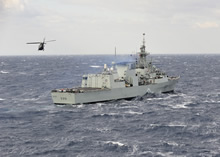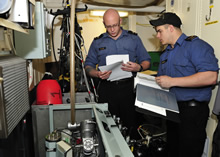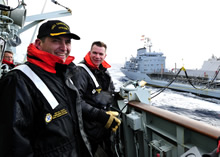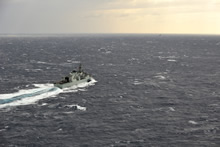Operation METRIC
Operation METRIC was Canada’s periodic participation in international efforts to enhance security in the eastern Mediterranean region, specifically the Middle East and North Africa.
Mission context
The Arab Spring and the rapid political changes that followed it led the Government of Canada to broaden its approach to security challenges in the Middle East and North Africa region. One result was the development of Operation METRIC as a flexible mission that can be used to deliver task-tailored Canadian contributions to a wide range of multinational initiatives in the region.
The first task force to deploy under Operation METRIC was Her Majesty's Canadian Ship (HMCS) Charlottetown, which served with the North Atlantic Treaty Organisation (NATO) fleet conducting Operation ACTIVE ENDEAVOUR in the Mediterranean Sea from 25 January to 29 April 2012.
Operation ACTIVE ENDEAVOUR
Part of NATO's multi-faceted response to terrorism, Operation ACTIVE ENDEAVOUR is a maritime mission conducted in the Mediterranean Sea by surface ships, submarines and maritime patrol aircraft under the overall command of Joint Forces Command Naples and directed from Allied Maritime Component Command Naples. These vessels conduct maritime security operations to demonstrate NATO's resolve to deter and disrupt terrorism, and defend civilians and civilian assets against it.
Canada's formal participation in Operation ACTIVE ENDEAVOUR began in 2004, with Operation SIRIUS. From 15 October to 14 December 2004, two CP-140 Aurora maritime patrol aircraft with crews and ground staff from 14 Wing Greenwood, Nova Scotia, were deployed in Italy to fly long-range missions over the Mediterranean Sea from the NATO air base at Sigonella, on the island of Sicily.
Over the years, five Canadian warships also deployed on Operation SIRIUS:
- HMCS Montreal (22 February-28 March 2005)
- HMCS Athabaskan and HMCS Iroquois in 2006,
- HMCS Toronto (October-December 2007), and
- HMCS Vancouver (1 November 2011-10 January 2012)
Mission effects
The entire global population depends on maritime shipping to transport vital supplies, especially food and fuel. NATO has accepted responsibility for protecting its member countries' maritime resources and international commerce from potential threats, as well as from possible attacks upon their territory that may come from the sea.
Although their mandate is limited to detection and deterrence of activities related to terrorism, the NATO fleet deployed on Operation ACTIVE ENDEAVOUR has enhanced security and stability in the Mediterranean Sea to the considerable benefit of trade and commerce. Operation ACTIVE ENDEAVOUR has also fostered interest in the Mediterranean Dialogue, the NATO program for security cooperation with Algeria, Egypt, Israel, Jordan, Mauritania, Morocco and Tunisia.
The maritime forces of Operation ACTIVE ENDEAVOUR can also play an important role in crisis management, handling tasks such as enforcing an arms embargo, conducting maritime interdiction operations, and providing immediate humanitarian assistance in the aftermath of a natural disaster.
Importance of maritime security
Globally deployed maritime forces offer the Government of Canada a range of options for intervention in crises outside our borders. Maritime security operations enhance Canadians' safety and security at home and abroad, and support Canada's foreign policy, and national and collective security objectives.
The deployment of frigates in support of Operation ACTIVE ENDEAVOUR also provide a way to support the Canadian diplomatic effort overseas and promote Canadian values through regular contacts and exchanges with regional partners in government, foreign militaries, coalition partners and development work.
Maritime security directly affects the availability and the cost of essential goods all over the world. Canada's economy depends on exports and approximately 90% of world trade is conducted by sea.
Past deployments on Operation METRIC
Task Force Charlottetown
The Halifax-class frigate HMCS Charlottetown deployed on Operation METRIC to serve with Standing NATO Maritime Group 1 as part of NATO's counter-terrorism mission in the Mediterranean Sea, Operation ACTIVE ENDEAVOUR. The presence of HMCS Charlottetown in the Mediterranean Sea also gave Canada the flexibility and capability to respond quickly in the event of emerging crises in the Middle East and North Africa.
HMCS Charlottetown carried a crew of about 250 personnel, including a CH-124 Sea King helicopter detachment. As part of the surface fleet deployed on Operation ACTIVE ENDEAVOUR, her task was to detect, deter and protect against terrorist activity by patrolling her area of responsibility.
HMCS Charlottetown departed her home port of Halifax, Nova Scotia on 8 January 2012. She remained in the Operation ACTIVE ENDEAVOUR area of operations until 29 April, when she docked in Djibouti en route to the Arabian Sea.



